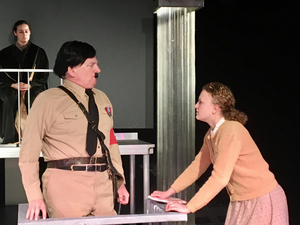Review: FALSE WITNESS: THE TRIAL OF HUMANITY'S CONSCIENCE At ReinART Productions
 In a hypothetical eternal court, Hitler is tried for his crimes against humanity. His defense? Martin Luther. The prosecutor? Anne Frank. So begins False Witness: The Trial of Humanity's Conscience by Robert Krakow, currently running at The Swan Theatre.
In a hypothetical eternal court, Hitler is tried for his crimes against humanity. His defense? Martin Luther. The prosecutor? Anne Frank. So begins False Witness: The Trial of Humanity's Conscience by Robert Krakow, currently running at The Swan Theatre.
The morality play does not spend much time debating whether or not Hitler actually committed any of his heinous acts ("we admit to these actions, which we argue are not criminal", Luther says early in the play); rather, the play focuses on making a case based on the actions of other historical figures - contemporaries of Hitler such as Henry Ford and Franklin Delano Roosevelt, as well as Richard Wagner and William Shakespeare.
In essence, the argument becomes that people like Ford and FDR supported Hitler, in various degrees, and Wagner and Shakespeare expressed the same anti Semitic sentiments that became so key to the Third Reich - thus, Luther argues that Hitler's actions were not that bad, since such important figures shared the same views, and may have even been a service for humanity. Indeed, the play puts the supporters (both intentional and otherwise) on trial, more than Hitler himself.
It's an interesting premise, and one that generally works quite well. The play is clearly well researched and includes little known, rather damning (and disappointing) information about some beloved figures. The main difficulty with the script lies, I think, in its brevity (the play runs about an hour), which may not allow for quite as much depth to the arguments; even so, it is an engaging piece that still provides the audience with a great deal to ponder about the systems and beliefs that allowed Hitler to rise to power in such a horrific way.
The cast, (well chosen and directed by Reed Meschefske) is made up of local actors who all suit their roles quite well. Mr. Meschefske has even found actors who in several cases bear more than just a passing resemblance to their characters, which is impressive and adds even more to the storytelling.
In the lead roles, Santa Fe High student Sage Merriam gives a performance that belies her youth - she has a wonderfully commanding, earnest presence that allows her to hold her own against the group of seasoned actors she questions. David McConnell is a delightfully smug Martin Luther, and William Potter is a terrifically menacing Hitler. Nadine Grantham Philips, last seen in the Santa Fe Playhouse's production of Fun Home as Medium Alison, trades the vulnerable energy from that role for a very powerful and grounded energy as the Chief Justice presiding over the trial.
The actors playing roles called as witnesses are wonderful, as well - Dan Burkarth's Richard Wagner, Stephen Jules Rubin's Shakespeare, Larry Glaister's FDR, Don Converse's Henry Ford, and Stefany Burrowes's Eleanor Roosevelt all give interesting and nuanced performances that emphasize the humanity of these figures, and makes it difficult to simply dismiss them as "bad" people.
False Witness asks some tough questions without a lot of easy answers, and is unlike a lot of theatre audiences in Santa Fe have probably seen before. It runs one weekend only, and is absolutely worth seeing.
False Witness: The Trial of Humanity's Conscience runs at The Swan (1213 Parkway Drive) Thursday, September 12 through Sunday, September 15th. Performances are nightly at 7, with a 2 PM matinee on Sunday.
Tickets are available online at https://www.brownpapertickets.com/event/4302824 and at the door.
Reader Reviews

Videos
